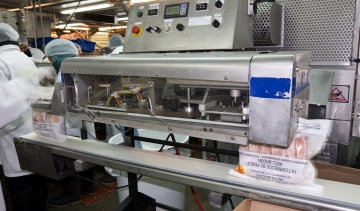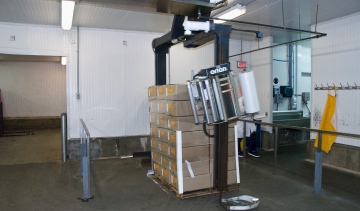
Home to roost
By George Guidoni, Editor
Automation FMC FoodTech Fortress Technology LLC Orion Packaging Pentaflex Packaging Sandiacre Packaging Machinery Triangle Package Machinery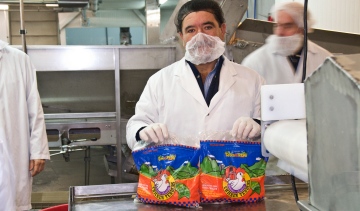
Groupe Desco production manager Manuel Nunes holds up bags of the company’s popular Green Peak Farms brand of chicken tenders processed at one of the company’s two Boisbriand plants.
Counting your chickens before they hatch is rarely a good business practice in any industry—especially in today’s fiercely competitive North American market for frozen foods. But fortunately for Groupe Desco, Boisbriand, Que.-based deli-meats and poultry processor, empty boasts have never been part of the company’s repertoire.
Since the company’s founding in 1980 under the name Viandes Guy Chevalier, it has grown from a food distribution services provider for the hospitality, restaurant and institutional sectors into one of the leading poultry and delicatessen-style meat processors in Canada and the eastern U.S.—nowadays supplying leading North American food manufacturers and private-label brands with more than 100 fresh or frozen meat products, along with about 50 top-quality smoked-meat offerings.
Operating two fully HACCP (Hazardous Analysis Critical Control Points)-certified, neighboring facilities located on an off-island suburb of Montreal—a poultry-processing plant built in the mid-1990s and a dedicated deli-meats operation started up in 2000—Desco’s reputation as a leading one-stopshop destination for the food industry’s biggest distributors and retailers can be traced directly to the company’s unwavering commitment to hygienic processing practices, leading-edge R&D (research-and-development) capabilities, outstanding customer service, and continuous capital investment in new generation processing and packaging machinery.
With all of its raw meat shipped to Boisbriand fresh exclusively from HACCP-accredited slaughterhouses across eastern Canada and the U.S., the company’s comprehensive array of cooking, packaging, deep-freezing and cold-storage facilities and technologies is capably matched by its penchant for creating mouthwatering chicken recipes, along with an ever-growing selection of hams, smoked and other delicatessen meats, as well as various innovative ready-to-heat products.
Boasting top-of-the-line processing and packaging equipment from leading manufacturers like Praxair, Cryovac and NuTek, among others, Desco has become very skillful at leveraging modern vacuum packaging and MAP (modified-atmosphere packaging) technologies into an important competitive advantage in recent years, relates production manager Manuel Nunes, to produce convenient, consumer-friendly packages that have really struck a receptive chord with swelling numbers of Canadian and U.S. consumers, retailers and foodservice operators.
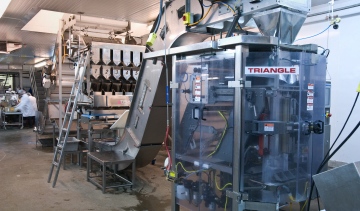
A Triangle weighscale system is used to measure and dispense precise quantities of frozen chicken products to be bagged into pre-zippered plastic pillow-bags.
Produced at the company’s original poultry-processing facility, the company’s flagship Green Peak Farms line of boneless, skinless chicken breasts has grown into a runaway bestseller in the U.S. markets, relates Nunes, while its recently-launched baconwrapped chicken tournedos have also been a big hit both as a Desco brand retailed in Canada, and as a private-label offering for leading U.S. grocers.
Quality First
“We only deal with the best-quality boneless chicken breasts we can get our hands on—that is the only thing we process at this 200,000-square foot facility,” Nunes told Canadian Packaging in a recent interview.
“That sure is a lot of chicken breasts,” adds Nunes, who has worked at Desco for the past 20 years to see an ongoing succession of capital upgrades and new equipment installations turn the plant into a highly-efficient manufacturing operation.
“We start at seven o’clock each morning and run our packaging lines right up to midnight every day, Monday through Friday, so it really is an enormous quantity of high-quality chicken meat that we cut, process, season, marinade and freeze to produce real value-added, but reasonably-priced, healthy protein meal solutions.”
Employing 80 to 90 people throughout most of the year, the plant serves its local retail customers by MAP gas-f lushing and repackaging the freshly-arrived, unfrozen chicken breasts in five- and 10-kilogram boxes to be packed at the grocers’ premises, while using the facility’s advanced DSI chicken portioning machine to make precise cuts of chicken breasts that are packaged in zippered plastic bags right after being individually frozen and ice-glazed to seal in the product freshness.
Manufactured by FMC FoodTech, a Chicago-headquartered subsidiary of FMC Technologies, Inc., the DSI portioner is a computer-controlled machine that utilizes waterjet cutting technology for portioning de-boned chicken prior to further processing—generating high-pressure water jets moving in both parallel or perpendicular directions of the product for optimal cut flexibility—to trim the fat and to portion the meat to desired target weight.
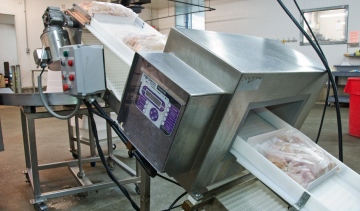
A high-speed, highaccuracy Phantom metal detection system manufactured by Fortress Technology is used to ensure contaminant- and debris-free packaging for all of Desco’s frozen and fresh chicken products.
“This machine allows me to size the breasts to virtually any size I want,” says Nunes, “and after that’s done, the chicken pieces are tumbled, marinated, individually quick-frozen, and bagged inside 2.5- or three-pound bags, depending on the product and customer.
“The fact that we individually quick-freeze the products makes them very easy to cook, as there is no need to dethaw them before cooking,” Nunes adds. “You can throw them right on the barbecue, make them on the stove top, bake or roast it in the oven … whatever you like.”
After the frozen pieces are conveyed onto the weighscale system from Triangle Package Machinery Company and dispensed in precision-weighed portions, the plant’s Sandiacre bagging machine starts loading the meat into the pre-zippered Inno-Lok rollstock film supplied by Pentaflex Packaging Limited, a leading producer of resealable pouches, rollstock film and other flexible food packaging products based in Montreal.
Until about four years ago, Pentaflex used to supply the plant with pre-made zipper pouches for the bagged chicken breasts, but a switch to the highlydurable rollstock bags—pre-printed in up to eight colors and incorporating 10-inch reclosable zippers running along the top—has made the line considerably more efficient, according to Nunes.
“It works extremely well in our busy production environment,” says Nunes, adding it usually takes about eight to 10 people to run the frozen chicken breast line, including manually putting the bags in into the shipping boxes and stacking them onto pallets—to be secured into place and readied for shipment by an Orion stretchwrapping machine.
“Compared to the way we used to run things, we are a pretty automated operation right now,” says Nunes, noting that using automated technology greatly enhances Desco’s ability to remain price competitive in the marketplace.

The advanced DSI chicken portioning machine employs high-pressure waterjets to trim the fat and portion the fresh chicken breasts down to the desired target weight.
Nunes says he is also pleased with the quality and durability of the multilayer, high-barrier plastic bags supplied by Pentaf lex to package the company’s chicken tournedos.
“We have our own special recipe and marinade to make the tournedos,” he says, relating that the plant’s high-speed former shapes white chicken meat into individual ‘pucks’ at about 55 units per minute, after which they’re passed through a freezing tunnel, conveyed down the line to have pieces of bacon manually wrapped around them, and transferred further down for bagging and boxing.
“We normally bag them 10 or 14 tournedos per bag, whatever the customer wants,” says Nunes, adding that the plant leaves nothing to chance to ensure optimal safety for all the products it makes.
“We are a federally-inspected plant, so there’s really no room or tolerance for any unsafe or unhygienic workplace practices or processes,” he states.
“We were actually one of the very first meat plants in Canada to achieve full HACCP compliance, and maintaining that compliance is absolutely necessary to maintain our business and protect our market growth,” he says, adding that the plant employs an array of advanced metal detection systems and X-ray inspection machines for optimal quality assurance.
“Everything we do here is tied to ensure the best quality control we can,” he sums up, “and, touch wood, our excellent safety record will remain intact for many more years to come.”
Photography by Pierre Longtin
Advertisement


